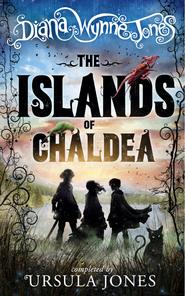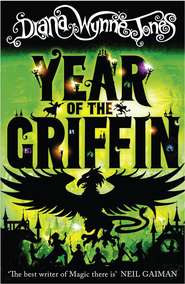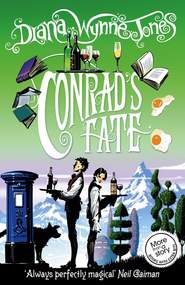По всем вопросам обращайтесь на: info@litportal.ru
(©) 2003-2024.
✖
Diana Wynne Jones’s Magic and Myths Collection
Настройки чтения
Размер шрифта
Высота строк
Поля
“Well, I wish Og joy of it, that’s all,” she said. “I wouldn’t like a great thing like that on top of my mound. Whatever words I said, I’d be afraid of it coming through and squashing me.”
Og might have forgiven Gest, but Gest was clearly still angry with Og. He refused outright to help Og against the Dorig. Og and Orban were forced to help themselves. In the autumn, having carefully armed and drilled the Otmounders, they attacked a huge body of Dorig who were moving east across the Moor. The Dorig were taken by surprise. Since words had stopped them shifting shape, they fled frantically south and west. Islaw saw them coming and hurriedly sealed its gates. But the Dorig did not attack. They went into the river near Islaw and that was the last of them for some time. The Moor became much more peaceful.
Luck seemed to return to Otmound after that. The people there grew richer. Orban’s wife Kasta at last had a baby which did not die. She called him Ondo. He was a fine, healthy child, but Kasta nevertheless fussed over him as if he was the most delicate baby alive.
“She makes me ill!” Miri said, after a particularly tiresome visit.
“She had four babies before, and they all died,” Adara reminded her.
“So she did!” said Miri. “Which makes this one so unusually gifted, particularly intelligent—” she mimicked Kasta’s harsh voice “—so exactly cut out to be a Chief! How can she tell? Just let her wait till your son’s born, that’s all. I’ll have the nursing of him, and I’ll show her!”
Though she was the Beekeeper’s wife and a Wise Woman, Miri was determined to nurse Adara’s son. There was quite a struggle for that honour, since everyone expected that son to be special, but Miri won the struggle because she was a Wise Woman.
But when Adara’s baby was born, it was a girl. Miri was speechless. She could think of nothing to say for a whole hour. Then she said, “Don’t you dare let her marry that Ondo!”
“No fear!” said Gest. He was enchanted with his daughter. He called her Ayna and walked about holding her proudly. She was fair and rosy and very like him.
Miri swallowed her disappointment, looked after Ayna carefully, and waited for the next baby.
He came the following year. Adara called him Gair. “Ah!” said Miri proudly. “Just look at him, Gest.”
Gest looked and was rather startled. Gair was dark and pale, like Adara, and stared solemnly up at Gest with big grey eyes. “Why doesn’t he smile?” said Gest.
“They don’t at first,” said Adara. “Even Ayna didn’t.”
“I expect you’re right,” said Gest. All the same, he remained a little awed by the strange, solemn baby, even when Gair was old enough to smile.
Two years later, Adara had another son. Gest, looking resigned, took Ayna in to have a look at him. Miri, chuckling with pride, unwrapped a baby with huge blue eyes and hair as dark as Gair’s. “Ceri,” she said. “Isn’t he a fine one?”
“Isn’t he a bit pretty for a boy?” Gest said doubtfully. He would have preferred another girl. Miri scolded him. She was delighted. Whatever Ondo’s nurse, Fandi, said, Miri knew they had done three times as well as Kasta.
The children grew up with all the other children, tumbling and quarrelling in the Sun that streamed into Garholt. It was a good time to grow up in. In spite of being the hero of three tasks, Gest proved the careful Chief everyone had hoped for. Garholt prospered and there was plenty to eat. Adara taught the children. Miri spoiled all three, particularly Ceri. In the evenings, Miri told them the stories from the tapestries round the walls. Their favourite was the newest: How Gest performed Three Tasks to Win Adara. Miri always told it them as it was generally told. She never hinted at her doubts, but she felt a little guilty at the way they drank it up and asked for it again and again.
CHAPTER THREE (#ulink_c2542cf9-fb82-508b-afba-c444c6bd6782)
One day, when Gair was five and Ayna six, Gair said wistfully, “When shall I be allowed to go hunting?”
“Next full Moon, of course,” said Ayna.
Gair looked at her incredulously. She was standing very straight and her face was grave and serious. He could see she meant it. Without bothering to ask how she knew, he trotted off to Gest and told him he was coming on the next hunt.
Gest looked up from lashing a spearhead and laughed. “Whatever put that into your head?”
Gair did not like being laughed at. His mouth trembled. “Ayna says I’m going. She told me.”
Ayna had followed Gair out of interest. Gest asked her angrily what she meant by putting such nonsense into Gair’s head. “It’s not nonsense. It’s true,” Ayna said. She was quite certain.
Gest opened his mouth to tell her what happened to children who made up stories. Before he could speak, Miri dashed forward. “Ask her something else!” she said excitedly. “Go on!”
Gest was annoyed. Miri was far too fond of bobbing up and preventing him scolding his children. “Ask her yourself,” he said crossly.
“All right,” said Miri. “Ayna, who’s going to be the next person to come into Garholt?”
Ayna again stood straight and grave. “Uncle Orban. He’s hurt himself.”
“Of all the—! “Gest began.
Before he could say more, Orban tottered through the doorway above them with a broken arm. “Met a Giant,” he said miserably. “Your place was nearest.” Seeing the way Gest was staring, he said irritably, “I’m not a ghost!”
Gest pulled himself together and welcomed Orban properly. He helped Orban to Adara to have the arm set. Miri bustled round in the greatest excitement. It was clear to her that Ayna had the Gift of Sight, which had not been known in Garholt for two generations. Better still, since Orban was here, she knew Kasta would hear of it at once. Gest and Adara both took a little more convincing. But, after careful questioning, they agreed that Ayna really did seem to have Sight. Gest went to the goldsmith to order the double-twisted collar Ayna was now entitled to.
The news caused great excitement. People crowded round Ayna to ask her things. One or two people, knowing that the Gifts often went by families, hopefully asked Gair questions too. Gair was unable to answer. He was ashamed. He tried saying the first thing that came into his head, but they soon saw through that and lost interest in him. Gair began to see that he was just ordinary.
Adara caught sight of him standing to one side of the excited group round Ayna, looking humble and sad. She pointed him out to Gest.
“I’ll take him out hunting to make it up to him,” Gest said without thinking.
So Ayna’s first prophecy was fulfilled. To his huge delight, Gair was taken on a real hunt. He thought he enjoyed it enormously. He toiled in the rear, his calves aching with the effort, bitten by midges and shivering in the night mist. The marsh underfoot made his boots three times their usual weight and his feet were numb. But he still thought he was enjoying it.
No one else on the hunt enjoyed it at all. It seemed to them that they were continually going back for Gair, waiting for Gair, telling Gair to be quiet, explaining things to Gair, or finding Gair in the way when they wanted to shoot. Twice they lost him completely in the tall marsh grass. It grew as high as a man’s head, and to Gair it was like a bamboo forest. Thoroughly exasperated, Gest told one of the girls to look after Gair. She did her best, but Gair was too proud to be carried and would not hold her hand. He kept asking questions too, and he was too young to understand the answers.
The full Moon set. Gest, by this time, had sworn never to bring Gair on a hunt again. He would have gone straight home, except that because of Gair, they had caught next to nothing. They had to go on. At dawn, they had caught sufficient, but they were far out in the marshes. Gair did not think he was enjoying himself any more. He was tired out and slower than ever. Gest debated waiting for night and decided it would be too much for Gair. He trusted to the long white grasses to hide them and they turned back.
In the middle of the morning, they met a party of Giants.
Gair could not think what was going on. The ground seemed to be quivering. Agitated birds went whirling up all round him, but he was suddenly quite alone. There was not a soul, not a dog, in sight. All he could see was grass.
Gest looked between the grasses and saw Gair standing in full view, directly in the path of the Giants. Cursing, he leapt up, threw himself on Gair and rolled with him into the damp bushes beside the nearest dyke.
“What—?” Gair said loudly. Gest pushed his face into the ground.
The booming voice of a Giant said, “What was that? It looked like an animal.” It sounded alarmed.
“Rabbit,” suggested another thunderous voice.
“Too big,” rumbled another. “More like a badger. Let’s see if we can catch it.”
Three or four of the Giants rushed trampling along the edge of the dyke. They had thick sticks, and they jabbed about with them, shouting. The bushes whipped about. The ground shook. Gair lay with most of Gest on top of him, most uncomfortable and utterly terrified. If he moved his face round on the peaty earth, he could see pieces of the bank falling off into the dyke. If he screwed round the other way and squinted, he saw twigs wildly shaking. Once, an enormous blurred foot came heavily down beyond the twigs. Gair winced. The size of the body above that foot must have been horrendous.
Luckily, the Giants had mistaken the place where Gest and Gair were lying. After crashing about for five minutes or so, they became bored and took themselves off, laughing and rumbling, away along the dyke. Eventually, the bank ceased to quake. Gest moved cautiously. Gair bobbed up from underneath, red and indignant with terror.
“Those were Giants! Why didn’t you kill them?”
Gest wondered how to explain that the only thing to do with Giants was to leave them alone. “There are far more Giants than people,” he said. “If we harmed a Giant, they’d kill everybody on the Moor. Get up.”
Gair realised he had said something stupid. That, and the thought of hundreds of huge Giants, so depressed him that tears began to trickle down his face.
Gest picked him up and carried him the rest of the way home. As they went, he went on trying to explain about Giants. “They’re stronger than we are, Gair, and they have a great deal of magic, which makes them very dangerous. And they steal children. If they’d seen you standing there, they’d have taken you away with them. I know. They stole a little girl from Islaw.”











